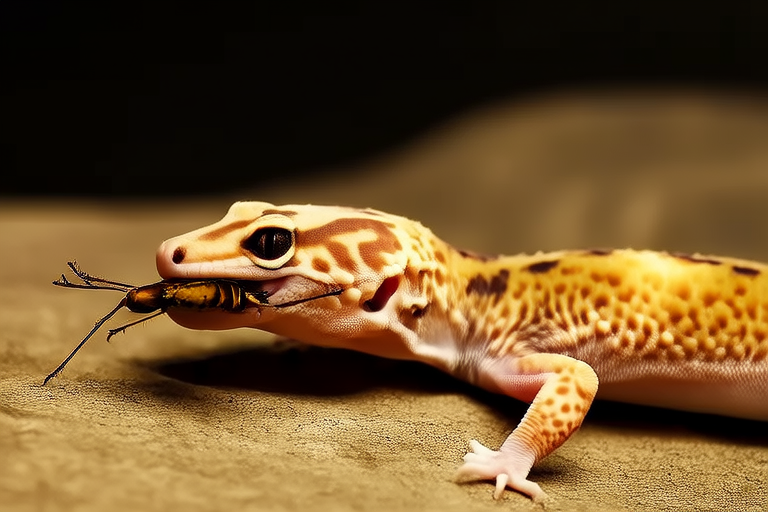The Ultimate Leopard Gecko Diet Guide: What, When, and How Much to Feed
Welcome to the comprehensive guide on feeding your leopard gecko. These small, ground-dwelling lizards native to the rocky deserts of Asia are popular pets due to their manageable size and docile nature. Leopard geckos have specific dietary needs that must be met to ensure they thrive in captivity.
Understanding Leopard Geckos’ Dietary Needs
Leopard geckos are insectivores, meaning their diet primarily consists of live insects. Their digestive systems are designed to process whole prey items, which provide them with essential nutrients. A balanced diet is crucial for maintaining their overall health, including proper growth, bone density, and energy levels.
Essential Components of the Diet
Crickets
Crickets are the most common feeder insects for leopard geckos. They are rich in protein and relatively low in fat, making them an ideal staple food. However, it’s important to note that crickets alone cannot provide all the necessary nutrients, so variety is key. Crickets should be fed to adult geckos every other day, with younger or more active geckos needing daily feedings.
Mealworms
Mealworms are another popular choice among leopard gecko owners. They are higher in fat than crickets, which can be beneficial for breeding females or underweight geckos. However, due to their high-fat content, they should be offered sparingly to avoid obesity. It is recommended to feed mealworms to adult geckos once or twice a week.
Waxworms
Waxworms are a treat for leopard geckos due to their high-fat and calorie content. They are best used as an occasional snack rather than a regular part of the diet. Feeding waxworms too frequently can lead to weight gain and potential health issues. Limit waxworms to once a week or less for adult geckos.
Gut Loading Insects for Optimal Nutrition
Gut loading refers to feeding the insects a nutritious diet before offering them to your gecko. This practice enhances the nutritional value of the insects, providing your gecko with additional vitamins and minerals. Gut loading can be done by feeding the insects vegetables, fruits, and commercial gut-loading supplements.
Supplementation Requirements
Calcium
Calcium is vital for maintaining strong bones and preventing metabolic bone disease (MBD). Calcium should be dusted onto the insects at each feeding. Dusting involves lightly coating the insects with a fine layer of calcium powder using a small brush. It’s important to avoid over-dusting, as excessive calcium can cause health problems.
Vitamins
Vitamin D3 is crucial for calcium absorption and metabolism. Leopard geckos require exposure to UVB light to synthesize vitamin D3, but in captivity, supplementation is often necessary. Multivitamin powders can be dusted onto insects weekly to ensure your gecko receives adequate amounts of essential vitamins.
Feeding Schedules, Portion Sizes, and Age Considerations
Feeding Frequency
Newborn and juvenile geckos need to eat more frequently than adults because they are growing rapidly. Juveniles should be fed daily, while adult geckos can be fed every other day. Adjust the feeding schedule based on your gecko’s activity level and body condition.
Portion Sizes
The number of insects offered should be proportional to the gecko’s size. As a general guideline, offer as many insects as your gecko can consume in 10-15 minutes. Overfeeding can lead to obesity and related health issues, while underfeeding can result in malnutrition.
Age and Activity Levels
The dietary needs of leopard geckos change throughout their lives. Young geckos require more frequent feedings to support their rapid growth, while older geckos may need fewer meals due to reduced activity levels. Always monitor your gecko’s body condition and adjust the diet accordingly.
Maintaining Health Through Eating Habits
Monitoring your gecko’s eating habits is an excellent way to assess its overall health. A healthy gecko will typically eat all the insects offered within 10-15 minutes. If your gecko consistently leaves uneaten food, it may indicate underlying health issues or stress. On the other hand, overeating can lead to obesity and related health problems.
Conclusion
Providing a well-balanced diet is essential for the health and longevity of your leopard gecko. By understanding the nutritional value of different feeder insects, implementing gut loading, and adhering to proper supplementation practices, you can ensure your gecko receives all the necessary nutrients. Regularly monitoring your gecko’s eating habits and adjusting the diet as needed will help maintain its overall health and happiness.
